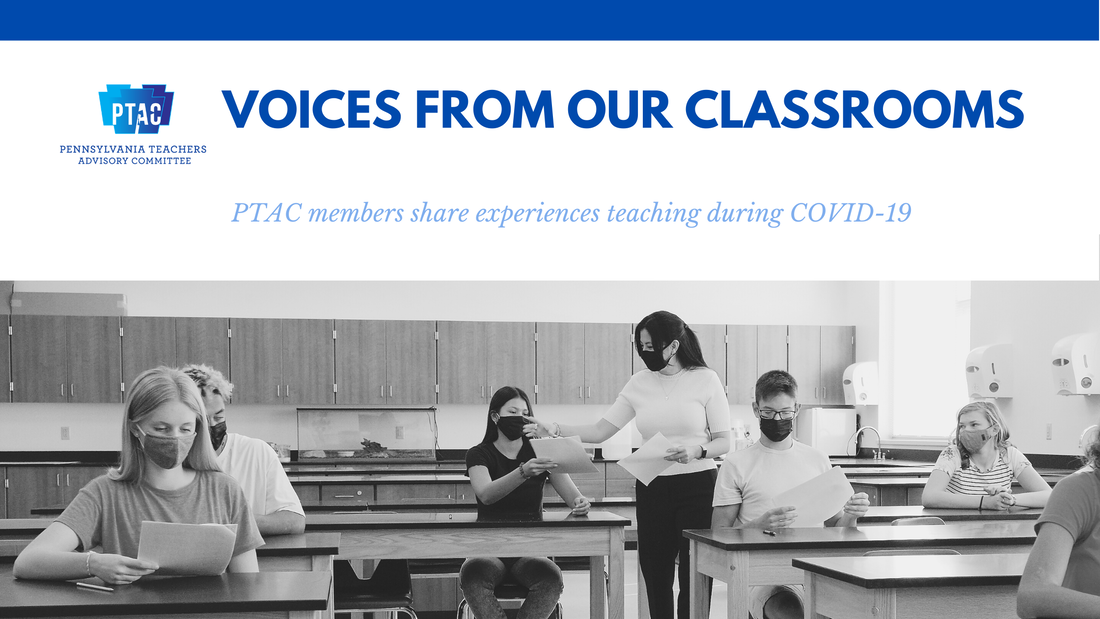BLOG POST BY PTAC MEMBER CHRISTIAN WRABLEY I was 13 years old, in my 8th grade History classroom, when my teacher explained that planes had flown directly into the World Trade Center, the Pentagon, and a field 30 miles south of our school. After he told us four planes had crashed in one morning, my classmates and I began nervously peeking out the window at the clear blue sky, hoping not to see more planes falling. I had so many questions. “Who would do this? How did people take control of those planes? How could this be planned to all happen at the same time? How could people be so evil?” My teacher spoke with calmness and clarity. He offered some possible explanations. He told us what he knew and wasn’t afraid to let us know that he didn’t have all the answers. He heard our questions though. I am so thankful that the school administration didn’t tell our teachers, “Do not talk about the terrorist attacks in school today.” Because we needed to talk. I needed some background information and some connection. My young mind was filling in the blanks either way. I appreciated those gaps being informed by a professional teacher, skilled in facilitating meaningful and emotional discussion. After the Capitol insurrection on January 6, I turned to my go-to Twitter teacher friends to see how they were responding. “How do they plan to talk about this with their students? What questions will they pose? Will they show pictures and videos?” I was alarmed to see some teachers saying they had received directives from administration not to discuss the events with kids. Please trust teachers to guide safe conversations with kids. We don’t want to wait until there is breaking news to figure out how to have difficult conversations with students. For teachers who are unsure of how to discuss current events with kids, my advice is to start small but start now. And do it regularly. Our students need to discuss current events, and if they can’t do it in our classrooms - designated learning spaces with trained professional teachers - then I don’t know where they can safely have these conversations. I know I needed to have them when I was 13. People seem to think that because we’ve been talking since we were about two years old, it’s something everyone can do. But that doesn’t consider that language is extremely delicate. Thoughts in our heads aren’t always clearly articulated when we try to put words to them. Conversations can be uncomfortable and awkward. It takes practice. The more you do it, the easier it gets and the better you will get at it. We don’t need to do it perfectly; we just need to keep doing it. I should also note that our classroom mantra is basically: “You’re allowed to be wrong inside here. You’re allowed to misspeak, say you don’t know right now, or disagree with me or others. Our goal is to get right before we leave here. This is our arena. This is where the messy work happens. That’s exactly what we’re here for.” A few weeks before the election, I was inspired by The New York Times’ Civil Conversation Challenge which fosters safe conversations with kids about powerful topics that can be uncomfortable. Since then, we have had 24 different Civil Conversation Challenges in class. (See some of our topics below.) Every Sunday morning, I post a Civil Conversation question online for students. In addition to responding to the question, students must also reply to one of their classmate’s comments. If they agree, they must explain why or with which parts. If they disagree, they are taught and coached to do it respectfully, with an explanation. They can also ask a question to a classmate to enrich and extend the conversation. On Thursdays, we hold these discussions in the classroom. When expecting students to contribute to a heavy conversation in class, I’ve found it beneficial to post the question several days before the live conversation, if possible. This allows students to prepare thoughts, ideas, or stories they’re comfortable and confident to share. The goal is for me to just listen quietly as they run the discussion. We often pass a Nerf brain around to designate who has the open line to speak. Each student gets a chance to hold the ball, but they do have an option to pass. I don’t require them to share their thoughts because sometimes topics may be too emotional to speak on or sometimes they may just not have the words or the confidence to speak on it. But some students who wouldn’t normally interject tend to speak up when the ball is handed to them. This simple system shows students that everyone’s thoughts are valued. It prevents a few students from dominating the conversation. In cases where spontaneous conversations arise, it’s important that we listen to understand rather than listening to respond. We have all had different life experiences that shape our lives and our values. What’s good for one student may be aggravating or damaging for another student. I always thank students for keeping an open mind and engaging respectfully with their classmates about meaningful issues. I encourage students to keep thinking, keep reflecting, and keep learning even when our conversations end. UPDATE: This week, I actually asked students to write about our Civil Conversation Challenge series in their journals. They expressed overwhelming support and enjoyment for these talks. They appreciate the value in being heard. They recognize the growth that comes from sharing thoughts and ideas. They rise to the occasion when they’re assumed to be mature rather than the opposite. I have two students: a boy in strong favor of preserving the language of the 2nd Amendment and a girl who is adamant about improving common sense gun control legislation. They are best friends. This week, they told me that our Civil Conversations often continue after they leave the classroom. They asked if I’d support them in doing a podcast episode to make their debate public. Meaningful discussions extend authentic learning and often lead to meaningful action. Even from young people. Here are some of their responses: “It’s good to get our opinions out and be able to say what’s on our mind.” “I enjoy our Civil Conversations because they give us a chance to share our opinions and understand where others are coming from.” “I love our class discussions. They always challenge us and make us think and communicate with each other. I feel like when we talk about these things in class, it helps us figure things out together and learn together as a class.” “I think it’s important to let kids express themselves. We have opinions and experiences and strong thoughts that deserve to be heard.” “We have social media that generations before us never had. This allows us to share thoughts with the world with the click of a button. But it can be dangerous too if we don’t know what we’re talking about. Our conversations feel like a safe place to practice sharing our thoughts.” I always include the following: “PLEASE REMEMBER: Our Civil Conversation topics can be sensitive issues to people in our classes. Please be cognizant of this, and respect other people’s views, experiences, and emotions. We should listen to others to understand different perspectives. We should be most respectful of others’ beliefs and preferences and experiences, and use our words to learn and have constructive conversations. I am grateful for this respectful space where you all can share your voices and learn from each other." CIVIL CONVERSATION CHALLENGE QUESTIONS What responsibility do you think schools have to address the use of slurs? What responsibility do YOU have to call out people who use them? Does our school reflect the changing diversity of the United States? What are the benefits of classrooms that include people from many walks of life? Does the U.S. need tougher gun control laws? What ideas do you have to improve this issue in our communities and our nation? Do you think happiness is a matter of luck or a mindset you can learn? Do you think we, as a society, give too much attention to physical health rather than mental health? Should there be more gender options on identification documents? Do you think the way we talk about and denote gender should be more inclusive of individuals who identify outside the binary? What does Black History Month mean to you? How can white and non-Black people of color better honor Black culture and Black history? Would you volunteer for a Covid-19 vaccine trial for teenagers? What do you see as the benefits of enrolling in such a trial? What are the possible downsides? Is summer school a smart way to make up for learning lost this school year? How do you think other students - students at different grade levels or with different learning needs - have been affected by this challenging school year? Should athletes speak out on social and political issues? Do they have a responsibility to use their platform and influence to raise awareness? Or should they stick to sports? Should schools be able to discipline students for what they say outside school or on social media? Or would those actions violate students’ right to freedom of speech? What do you think of the decision by tech companies to block President Trump? If you were the chief executive of a social media company, how would you respond to the actions of January 6? What is the purpose of school? Is it to prepare for more school and get a good job? To prepare us for “the real world”? Are all Americans treated equally? Our founding documents say, “All men are created equal.” Are we living up to that promise or claim? What does it mean to be a good citizen? Does a good citizen follow the law all of the time? Are there exceptions? Are there unjust laws that still exist? How should we remember the problematic actions of our nation’s founders? Should we take down the monuments of enslavers? Or should they remain? What role might your identity and life experiences play in how you feel about this issue? My teachers taught me how to deal with tragedy. They showed me the world in a way that allowed me to begin to figure out where I fit in. They coached me in learning skills to navigate the troubled waters. And now I spend my days in a classroom full of 8th graders getting a chance to give that back. I hope to teach them kindness and empathy. I hope they learn lifelong skills and develop action plans for how to take on challenges. Our students see the world through curious lenses, constantly craving new information and stimulation. Their brains are still developing and their minds are malleable.The world actually comes to them -- new information arrives by the second as their phones light up like traffic flares, demanding urgent attention. Ready or not, the news is coming.
0 Comments
Your comment will be posted after it is approved.
Leave a Reply. |
AuthorPennsylvania Teachers Advisory Committee Archives
March 2022
Categories |


 RSS Feed
RSS Feed